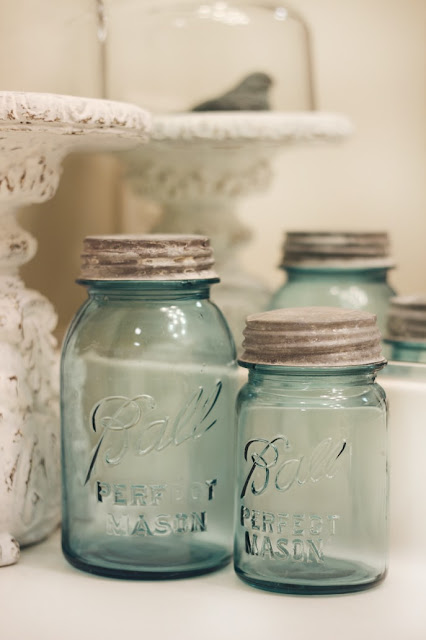By disposing of your trash responsibly and reusing what you can, you’re sure to shrink your carbon footprint and make your household more sustainable and environmentally friendly.
Glass jars make for an excellent reusable tool if you save and wash them after use. Once you clean them thoroughly, they can be great storage containers for anything from dry goods to flower vases. You can keep them in your kitchen to keep hot grease that shouldn't be poured down the sink because it affects the sewer systems and treatment operations.
If you cook for yourself, you may find that glass jars are handy to store food in. Soups and sauces, depending on the size of the jar, can find their new home in recycled glass. If the jar you plan to use didn’t come with a lid, consider fashioning one for yourself out of tin foil and a rubber band. That way, the jar’s contents can stay fresh.
2. Food Scraps
Keep the leftovers from last night's dinner, even if you don't think you'll eat them again. You can use certain food scraps — barring outliers like meat — for natural and free fertilizer in your garden. By composting food, you help the environment and can watch the fruits of your labour grow, and you can avoid many of the diseases plants can catch.
You can even use washed eggshells to hold small plants like herbs or baby succulents. They make excellent planters because of their small size. Make sure you poke a drainage hole in the bottom of the eggshell before it dries — this way, it won’t crack, and you can plant your herbs without fear.
3. Tissue Boxes
A tissue box can store things other than tissues. When you bring your groceries home, save the plastic bags as you empty your groceries. You can store these plastic bags in the tissue box whenever you need them. You may use them to carry toiletries or as a bathroom trash can liner. All you must do is simply pull one out of the tissue box.
Additionally, you can cut tissue boxes open and pull them apart to create drawer dividers on a budget. This way, you can keep the smaller things in your home organized. A tissue box divider could work well for smaller clothes or accessories in a dresser, but you could also use it to keep utensils tidy in a kitchen.
4. Tattered Clothing
Donating clothing you don't wear anymore is commendable, but you should avoid donating anything with excessive stains or holes. Still, even if some of the clothing you don't want is beyond repair, you don't have to trash them.
Consider tearing that clothing up and using it for rags, which could make an excellent replacement for single-use paper towels. Alternatively, if you already have a green way of cleaning up spills, you can use your tattered clothing to help pad animal beds or line a crate.
5. Newspapers
Newspapers are multi-functional items that you shouldn't recycle without a second use unless necessary. They can be vital to many areas of your home, and after learning the benefits of keeping spare newspapers around, you may never want to recycle it without doing something creative with it first.
Newspapers naturally absorb odours. You can put them in the soles of well-worn shoes or in your fridge to get rid of some of the smell. Similarly, you should conserve newspapers if you have a pet that hasn't yet been potty-trained. You can teach your pet to rely on newspapers when it can't make it outside in time. Remember that praise is key when potty training a pet, and soon you’ll have to find another use for spare newspapers.
If you're planning a move, save your money. Buying bubble wrap for all your fragile belongings can be costly. Aim to wrap them in layers of newspaper instead. This will keep them safe, and you can recycle the newspaper afterward. You can also use it for gift wrappings. Using the comic pages of the newspaper could make for entertaining wrapping paper for the right recipient with a sense of humour.
6. Citrus Rinds
If you want a house that smells clean, but you try to avoid aerosol-based air fresheners, consider using the rinds of citrus fruit. Aerosol-based air fresheners have a notoriously negative effect on the environment by increasing climate sensitivity and contributing to climate change.
Citrus peels can help your house smell fresh without causing damage to the environment. All you need to do is boil them in water, and your home will smell fresher before you know it. If they go bad before using them, you can always compost them instead!
7. Old Furniture
When your furniture feels like it can’t go on, consider recycling and reusing it for another project or for scraps. You don’t have to stick with the same couch forever, but you could use the fabric for another project. If you’re not a fan of how your furniture looks, reupholster it to breathe new life into it.
Sometimes, as much as you love an item, it isn’t worth saving. Consider taking any wood from the furniture you plan to scrap to use for future DIY projects. That way, you’ll still have a piece of your beloved furniture with you as you create something new. You may also use these wooden parts to fix something else in your house.
Rethink Your Waste
Everything has its place, and you can still use it for something else when its time is up. Instead of creating more waste, look at something and think of the possibilities it holds. If you’re a creative person, you may find that these options are limitless. While these upcycled items won't last forever, you can still prolong their lifespans by giving them another purpose — thereby serving your household for an even longer time.
*Collaborative post


0 comments